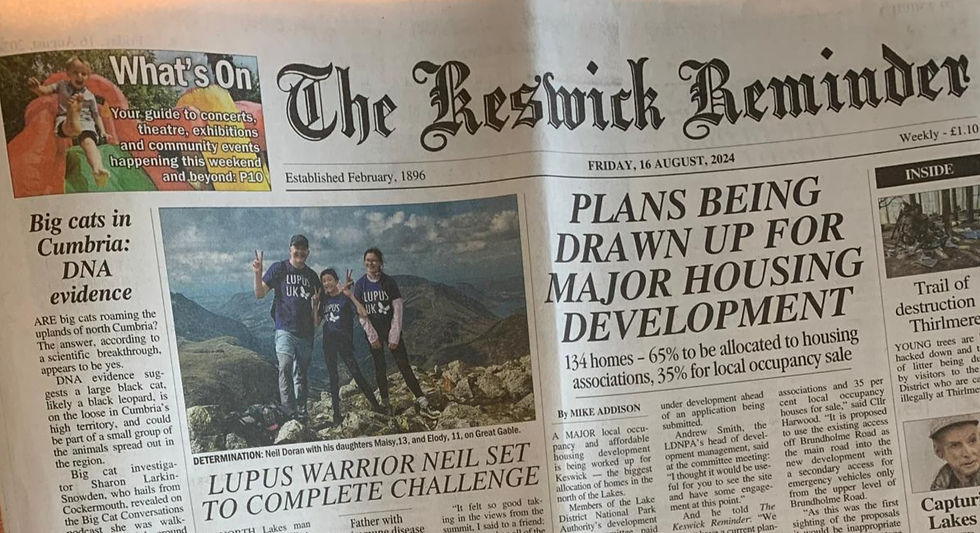Jonathan Heawood reflects on what a century-old newspaper in Cumbria and a recently shuttered outlet in Lincoln can tell us about the crisis in local news, and how this informs the work of PINF's Local News Commission.

I went on holiday to the Lake District last week. I thought a few days among the high fells would give me a break from worrying about the future of journalism. But I just can’t help myself, and as soon as I got there, I picked up a copy of the local paper, The Keswick Reminder.
The Reminder was established in February 1896. Almost 130 years later, it’s still providing rich coverage of the local area. The print edition comes out once a week, with twelve broadsheet pages of news, features and ads. The front page on 16 August included stories about a housing development, fundraising walks, the tragic death of a fell runner, a panther roaming the uplands of north Cumbria, and TV presenter Dan Walker scoring 10 holes-in-one at the Keswick crazy golf course. I found it all utterly engrossing.
Since 2020, the Reminder has been owned by Andy Barr, a local businessman who is building up a small but impressive portfolio of titles, including the Cumberland and Westmorland Herald, which also has a weekly print edition, and the online-only Cumbria Crack. Barr’s main business interests are in engineering, and I understand that he isn’t looking to make a profit from his media holdings but does want them to break even.
It was encouraging to see these signs of life in the Cumbrian media, but very sad to return home to the news that The Lincolnite is closing, with the loss of nine jobs. Daniel Ionescu has been a leading figure in the indie news sector since he co-founded The Lincolnite in 2010. He is a restless innovator, who recently launched the My Local app to provide a dedicated platform for local news. It is troubling to see such a forward-looking business added to the growing list of local news outlets that we have lost in recent years.
This all goes to show the fragile state of local news in the UK – which is why we launched the Local News Commission earlier this year. With commissioners drawn from the public, private and voluntary sectors, we are looking for structural solutions to the problems affecting local news.
The Commission held its first meeting last month and discussed the value of local news. Our commissioners don’t have backgrounds in the industry, so they bring a fresh perspective to this issue. Alongside traditional ideas of holding power to account, commissioners also highlighted how local news – at its best – can facilitate ‘community intimacy’ and ‘hope and agency’.
For the next meeting of the Commission, we’ll be in Manchester, hearing from local news providers in the north-west about the challenges and opportunities they face. Later in the year, the commissioners will look at solutions to the local news crisis in other countries and will draw all this evidence together in recommendations for government, to be published early in 2025.
Some people think that local news should make its own way in the world, without support from government. I find this idea rather odd. Most successful industries benefit from government intervention of one kind or another.
The hugely profitable UK construction sector (worth £133bn in 2022) relies on favourable planning laws to unlock demand. The even bigger supermarket industry (£212bn) relies on our publicly-funded road network to move goods around the country.
Within the media sector, independent filmmaking in the UK is underwritten by significant tax incentives. The local news industry itself is hugely affected by current government policy, including the support that the big three corporate publishers (National World, Newsquest and Reach) receive via public notices and the BBC Local Democracy Reporting Service.
So, the question isn’t whether the government should support local news, but how this support should be structured in order to ensure a sustainable and independent industry that truly meets the needs of local communities.
Ultimately, we need audiences to value local news. If local news meets people’s needs, they will be more likely to support it. And if reader revenues are invested wisely in the quality of the local news experience, then more people will pay, and so on. With the right kind of interventions by government, philanthropists and big tech platforms, we can inject new energy into the sector, attracting new audiences and creating a virtuous cycle.
I’m looking forward to seeing what the Local News Commission recommends, so that we can turn the current crisis into an opportunity to build a new era of local news that truly meets the needs of the communities it serves.
Jonathan Heawood is Executive Director at PINF.
Sign up to our newsletter for more updates from PINF, and donate to support our work.
